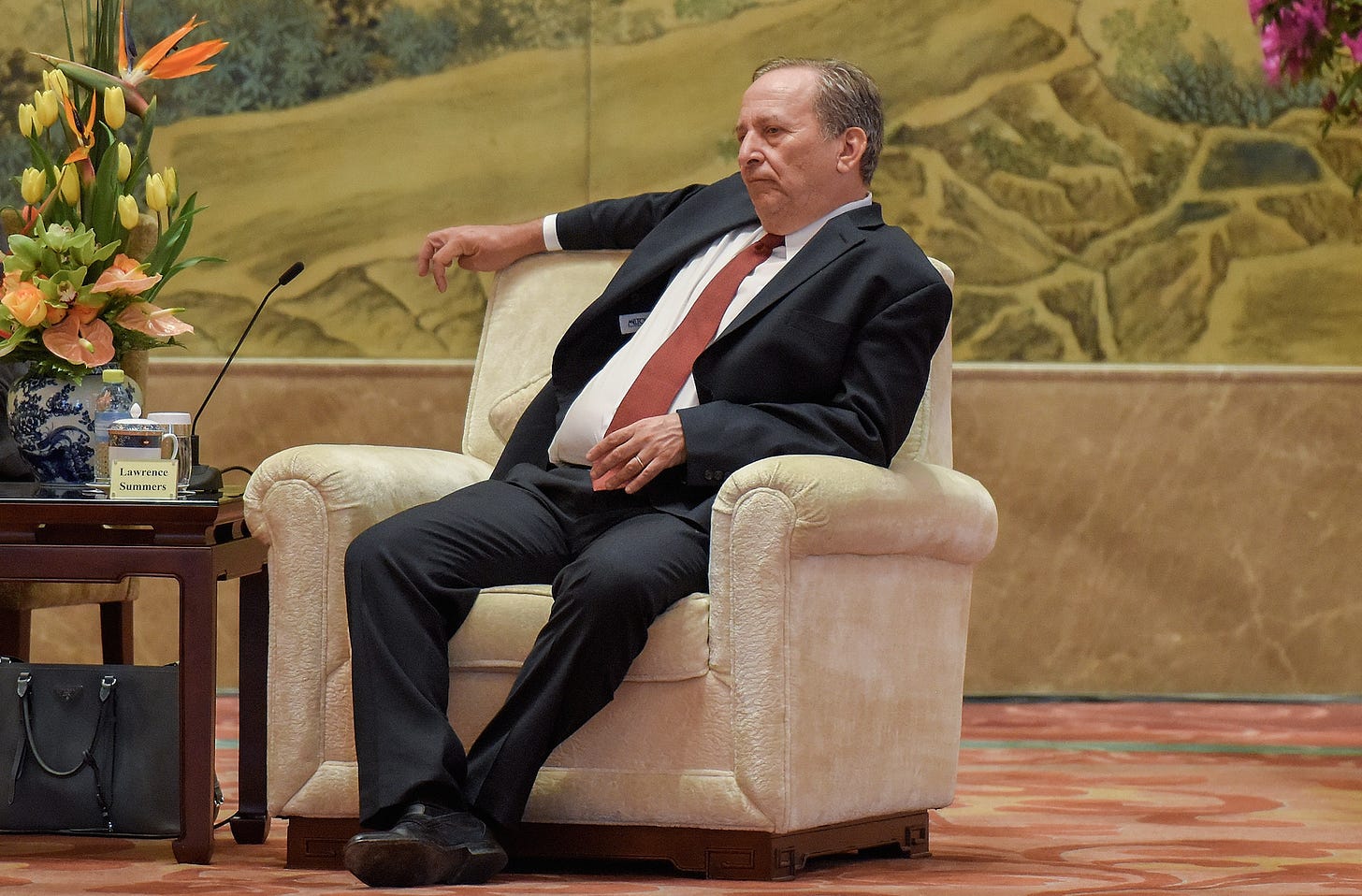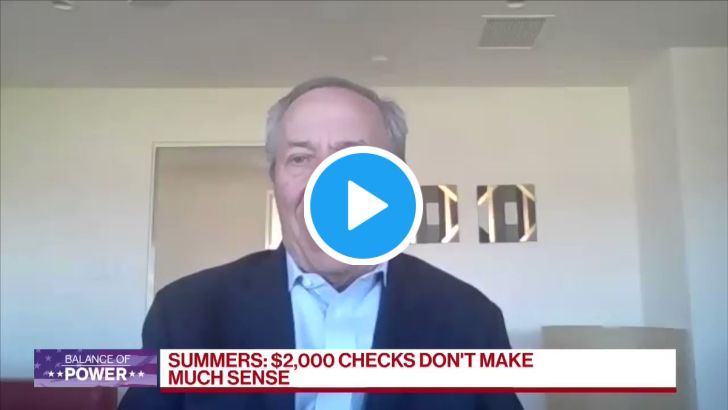Neoliberal Champion Larry Summers Opens Mouth, Inserts Both Feet
The former Harvard President and Treasury Secretary offers important thoughts on the negative consequences of aid to the less fortunate
Lawrence Summers, the former Treasury Secretary under Bill Clinton, director of the National Economic Council under Barack Obama, president of Harvard, and Chief Economist at the World Bank, wrote a post-Christmas editorial for Bloomberg entitled, “Trump’s $2000 Stimulus Checks are a Big Mistake.” It’s a classic:
Some argue that while $2,000 checks may not be optimal support for the post-Covid economy, taking stimulus from $600 to $2,000 is better than nothing. They need to ask themselves whether they would favor $5,000, or $10,000 — or more. There must be a limiting principle.
The genesis of this Summers article is a perfect tale in microcosm about how America’s intellectual elite manages to lose elections to people like Donald Trump. It’s a two-step error. First, they put people like Summers in charge of economic policies. Then, they let them talk in public.
Summers the day before Christmas appeared on Bloomberg to offer his initial thoughts on why $2000 checks must be bad: he looked at which politicians were supporting the plan, and worked backward. “When I see a coalition of Josh Hawley, Bernie Sanders and Donald Trump getting behind an idea, I think that’s time to run for cover,” he said, adding: “When you see the two extremes agreeing, you can almost be certain that something crazy is in the air.”
After delivering that cheery message, Summers got feces-pelted on the Internet:
Seeing that his comments “lit up the Twittersphere,” Summers then sat down to compose an article doubling down on his reasoning. Essentially, he argued that from an econometric point of view, we’re already overdoing it on the help front. If you were under the impression that huge numbers of people are living off meals from food banks and/or are at risk in an eviction crisis, you were wrong.
Noting that “total employee compensation” is “only running about $30 billion per month behind the Covid baseline,” he insisted that $200 billion more in tax rebates per month over the next quarter would “equal an additional seven times the loss of household wage and salary income over the next quarter.”
He then showed a graph explaining that “because of the legislation passed in 2020, total household income… has exceeded normal levels relative to the economy’s potential more or less since the pandemic began.” The good news, as a result, is that “the existing stimulus bill is sufficient to elevate household income relative to the economy’s potential to abnormally high levels — unheard of during an economic downturn.”
The whole piece reads like an extended New Yorker cartoon, in which an evictee with empty pockets is about to dive after a rotten apple core in a dumpster, only to be blocked by a cauldron-bellied Harvard economist in a $3000 Zegna suit. Caption: “Actually, total household income relative to the economy’s potential sits at abnormally high levels.”
There are of course different positions one could take on the question of stimulus checks, but the issue with people like Summers is the utter predictability of their stances. Summers belongs to a club of neoliberal thinkers who’ve dominated American policy for decades. From Bob Rubin to Tim Geithner to Jason Furman to Michael Froman and beyond, the people one friend jokingly refers to as the “Rubino Crime Family” are all basically the same person, affectless technocrats who play up reputations as giant-brained intellectuals — I always imagine them with bulbous Alien Nation heads — while reveling in cold, hard truths about the limits of government assistance.
Of course, these same people often believe in jaw-droppingly enormous levels of public aid. Think of the $20 billion in taxpayer funds that went to rescue currency traders in 1995 (presented in the media as a bailout of “Mexico”), the massive IMF bailouts of Asia and Russia in the late nineties, and especially the multi-trillion-dollar Fed-fueled rescues of the finance sector both after 2008, and now (“We’re not going to run out of ammunition,” explained Fed chief Jerome Powell). Other examples include giving companies like Goldman, Sachs 100 cents on the dollar on debts owed them by AIG in that bailout, or the $3.625 billion private intervention to save one crackpot hedge fund called Long Term Capital Management in 1998.
The operating principle in most of those cases was that financial institutions must not be allowed to take crippling losses, even if those losses were the fault of the companies in question, because such a decision might trigger (pick one or more) “a chain reaction,” “catastrophic losses throughout the system,” “graver economic consequences,” the “spread” of investor “flu,” etc., etc.
The thinking of these experts changes, however, the instant the question shifts to rescuing individuals affected by something like the 2008 crash, or the current pandemic. Suddenly we learn that resources are scarce, and the commitment of public money to rescue mere People With Problems risks “moral hazard.” Hence the horror-laden rhetorical question from Summers about whether people favoring the distribution of $2000 checks would also favor getting another $5000 or, God Forbid, $10,000. If we give some, they might want more! Think of the can of worms that would be opened, if we just gave money away!
Such people are also quick to remind us that mass aid to people from central banking systems carries a terrifying inflationary risk that somehow didn’t exist when they were arguing in favor of trillion-dollar financial-services bailouts, or Quantitative Easing, or whatever other “liquidity” injection plan to save the macroeconomy they were trumpeting five minutes ago. As Summers puts it, with regard to the current plan:
We frankly have no confident basis for judging how much and how fast this excess, and the pre-existing backlog of saving from the Cares Act, will be spent. There is the possibility of some overheating…
I’ll be the first to admit, I’m no economist. I have, however, been covering people like Summers long enough to guess their opinions on issues like stimulus checks, mainly by tracking their social imperatives. Most have gone years without interacting with someone with a net worth of less than $5 million, unless spotting someone out the window of a G500 counts. They have an absolute belief in exposing everyone to the ruthless judgment of markets, unless we’re talking about transnational companies (read: the institutions most likely to pay them huge speaking fees), who in the event of an emergency should be protected at all costs, from themselves most of all.
One could almost respect the effort — if I were a titan of industry or a scion of inherited wealth, I would love to have people like this around, to justify all the rules that need writing to make sure I keep my stuff — except the Summers/Rubin types have a third dependable quality, a total inability to hide their most regressive ideas. They’re immensely proud of their intellects and have a tendency to brag about their jerkiest thoughts to the public, doubling down 100% of the time in response to criticism.
Even after Summers got flak from all over years ago for writing that the “underpopulated countries of Africa are vastly underpolluted” (because dumping poison in developed countries packed with highly efficient wealth-creating folks is relatively counter-productive), he couldn’t help himself. For years, every time he said something apologetic about that incident like, “When I make a mistake, I make a whopper,” he’d add a caveat. Even if the way he expressed himself wasn’t constructive, he’d say, there are “real issues about trade-offs between growth and the environment.” As in: Boy, I was really wrong, except, of course, for this, and that, and that other thing…
This Bloomberg piece is just the latest iteration of the unfailing aristocratic instinct to shove a second foot in already full mouth, and a reminder. When Trump got elected, voters were comparing him to guys like this.






I'm not an economist either but I'll bet Summer's objection to giving $2,000 checks is more about cruelty than economics. Look at his face -- hardened, dissipated and with eyes that would freeze a rattlesnake in its path. He didn't object to the billions handed out in the 5,000+ pages of this bill. There's a clue.
I know it is not right to hate anyone.